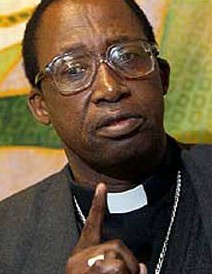By Cosmas Desmond
Nehanda Radio
July 23, 2007
http://www.nehandaradio.com/desmondonncube230707.html
Zimbabwe — Even the prospect of a senior Roman Catholic clergyman being exposed as an adulterer is enough to occasion an orgy of schadenfreude. This could be considered a back-handed compliment in that it reflects the high esteem in which the clergy are held.
On the other hand, it is true that throughout history priests, bishops and even popes have succumbed to the weaknesses of the flesh. Contrary to popular perceptions, however, there is no evidence that Catholic priests are more prone to this than anybody else. They just get more publicity and people tend to take more delight in their downfall.
 |
| Pius Ncube |
It is not surprising, therefore, that the Zimbabwean state media has had a field day in publishing what have been described as "lurid, grainy photographs they claim is Catholic Archbishop Pius Ncube allegedly taken inside his bedroom with a naked woman".
An attorney and friend of the archbishop, David Coultard, has pointed out that the "incriminating" photographs were blurred and did not conclusively show the archbishop. Others have suggested the incident has all the hallmarks of a set-up; the archbishop himself has denied the allegation and says it is "part of a long-term strategy" to discredit him.
It would not be for me to pass judgment on the archbishop even in the unlikely event of his being found to have committed adultery. Nor would it be for anybody else to do so, except in the even more unlikely event that there is someone who is "without sin" and is therefore in a position to "cast the first stone". President Robert Mugabe, who has condemned the archbishop for breaking his vow of celibacy, is hardly a credible candidate for this position.
 |
| Cosmas Desmond |
Leaving aside for the moment his more horrendous violations of human rights, like being party to - to put it very mildly - the massacre of 20 000 civilians in the early 1980s, he is hardly a paragon in the field of sexual mores. In rebuking the archbishop, he said he had not taken a vow of celibacy and that he had not had an affair. He did, however, like all married people, take a vow of fidelity to his wife. Nevertheless, without breaking his marriage vows and without having an affair, he contrived to sire two children by another woman in the 1990s.
Unfortunately for him, his wife did not have the authority to release him from his marital obligations on the grounds of her putative barrenness. Mugabe also said, rather sanctimoniously, that he would pray for the archbishop "so that he repent and return to morality". This suggests, as many Roman Catholics seem to believe, that "morality" refers primarily to sexual behaviour.
But morality embraces far more. In Christian teaching the central precept is to love our neighbour, which is the only measure of our love of God. True, committing adultery also violates that precept because some people are harmed, but it is violated, often even more seriously, in other ways - like evicting thousands of people and destroying their homes, or torturing people, let alone destroying a whole country.
I can no more condone adultery than I can condemn a particular perpetrator, but I know that if I had to face judgment, before God or man, I would much rather have Archbishop Ncube's moral record, whatever his "weaknesses of the flesh", than Mugabe's. For many years, despite threats and vilification, the archbishop has conducted a courageous, and often lonely, campaign to stem the ravages of the Mugabe regime and to rally the churches and others to this cause.
The citation for his award from Human Rights First in 2003 stated that despite being slandered and under constant threat to his personal safety, "the archbishop continues to be a shining light in the fight for human rights - demanding that his government address the mounting food and economic crises and put an end to torture and rape".
"Archbishop Ncube has often spoken out to denounce political violence and manipulation of food aid, in particular. He has helped to mobilise a multi-denominational church coalition in Zimbabwe, which is now seen as one of the major potential forces in resolving the crisis." He recently rallied church leaders in Zimbabwe to put out a report on pro-government youth militias which are responsible for torture, rape and murders. The report, based on the church officials' observations, estimates 30 000 to 50 000 boys have been recruited to play a part in these militias.
He also called for increased international pressure to dismantle the National Youth Service Training Programme, which was created in 2001. The report said the programme was in reality "a paramilitary training programme for Zimbabwe's youth with the clear aim of inculcating blatantly antidemo-cratic, racist and xenophobic attitudes. The youth militias so created are used as instruments of the ruling party, to maintain their hold on power by whatever means necessary, including torture, rape, murder and arson."
The then US secretary of state, Colin Powell, wrote in the New York Times in 2003: "A brave man recently met with me and described how life in his country has become unbearable. " 'There is too much fear in the country, fear of the unknown and fear of the known consequences if we act or speak out,' explained Pius Ncube, the Roman Catholic archbishop of Bulawayo. Yet Archbishop Ncube speaks out fearlessly about the terrible human rights conditions in Zimbabwe, and is threatened almost every day with detention or worse."
He continues to be threatened and continues to campaign against corruption and misgovernment. Whatever the outcome of the lawsuit- if it ever happens - nothing can take away his long and laudable record of championing the rights of people who have been sorely oppressed for so long. -Cape Argus.
Any original material on these pages is copyright © BishopAccountability.org 2004. Reproduce freely with attribution.